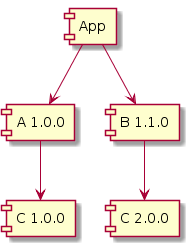Complementary material to docs.scala.org's Binary Compatibility Guide.
The goal of this repo is to help library authors reduce the amount of binary incompatible releases they have to make. Here you'll find:
- The Dos and Don'ts when writing your Scala library
- Examples of binary and source incompatible changes
More obvious incompatible changes such as removing a class/method won't be documented explicitly.
- Binary Compatibility Code Examples & Explanation
- Code Examples
- Detailed Explanation of the DOs and DONTs
- DO: Mark methods as package private when making breaking API changes
- DONT: Adding parameters with default values to methods
- AVOID: Using Case Classes
- DO: Annotate method return types explicitly
- DONT: Adding methods with default implementation to traits (2.11 or before)
- DONT: Inlining from other libraries
Ensure you have SBT installed and run the script
./publishlibs
It will publish all libraries locally for both Scala version 2.11 and 2.12.
After that,
cd app
sbt +run
to execute the application under both 2.11 and 2.12 (since certain examples only apply in older scala versions)
This repository sets contains 4 scala codebases simulating real world relationship between different libraries.
First we have App, our application which depends on library A and B.
Both library A and B depends on another library common. However, library A depends on an older version of common (common_old), and thus during execution the older
version common_old depended on by A is evicted.
Here's a visualization of the dependency graph:
Marking methods as package private only breaks source compatibility, which means you can break APIs safely without breaking binary compatibility.
Before:
package com.example.mypackage
class MyClass {
def method(str: String)
}After:
class MyClass {
private[mypackage] def method(str: String)
}Scala version: all
Incompatibility: binary
Although it may not cause compilation errors, modifying the parameter list of a method will change its signature, resulting in NoSuchMethodError for code
compiled against an older version
Scala version: all
Incompatibility: Binary + Source
Scala automatically generates a lot of methods for case classes (e.g. equals, hashCode). The signature of some generated methods like unapply depends
on the case class constructor parameters, and thus adding or removing parameters from the case class's primary constructor will break binary compatibility.
// Old
case class MyClass(first: String, second: Int)
// Old, generated interface in class file
class MyClass {
// ... constructor and other methods
def unapply(obj: MyClass): Option[(String, Int)]
}
// New
case class MyClass(first: String, second: Int, third: String = "default!")
// New, generated interface in class file
class MyClass {
// ... constructor and other methods
def unapply(obj: MyClass): Option[(String, Int, String)] // different method signature!
}We recommend NOT to use case classes unless you
- are confident that the case class's fields will remain constant as libraries evolve
- really need methods such as
unapplybeing generated for you
If you still want all the benefits of a Contraband is another alternative for generate your classes and is designed to better facilitate library evolution without binary breakages. (It is used by SBT)
Scala version: all
Incompatibility: Binary + Source
When the return type of a method is inferred by the compiler, modifying the content body sometimes changes the inferred return type and thus breaks binary compatibility (different method signature). Therefore, we recommend annotating the return type of all methods explicitly.
An example from the Scala standard library:
In Scala 2.11 and previous versions, Option#toRight's return type is inferred to be Product with Serializable with Either[X, Int], however we were not able to correct it to Either[X, Int]
by explicit type annotation because it would break binary compatibility. The type annotation was added only in the intentionally binary incompatible 2.12 release.
Scala Version: 2.11 or before
Incompatibility: Binary
Before Java 8 (which 2.12 targets), interface methods cannot have default implementations.
In order to support default methods for traits, Scala 2.11 and before
automatically overrides the method for classes that extend the trait. However if no recompilation
of the library is performed with the updated trait (with the new defult method), no override method is generated
and an AbstractMethodError will be thrown when the default method is called.
See this StackOverflow question for a more detailed explanation.
From Scala 2.12 release notes
If you are building a library to publish on Maven Central, you should not inline code from dependencies. Users of your library might have different versions of those dependencies on the classpath, which breaks binary compatibility.
This means that when using -opt:l:inline, care needs to be taken to not inline from dependencies
on the classpath. For example, -opt:l:inline -opt-inline-from:<sources> is safe
because it will only inline source files compiled in the current compilation unit,
while -opt:l:inline -opt-inline-from:some.other.library.** is not safe because it may
inline methods from a library you depend on.
For more information, you can run scalac -opt:help and scalac -opt-inline-from:help
